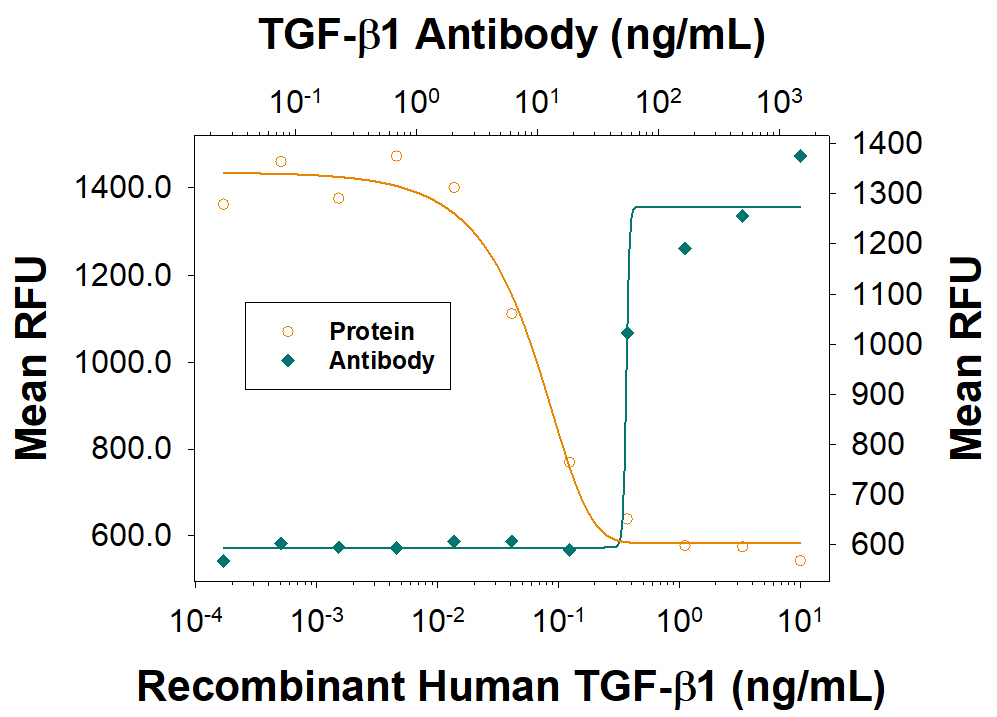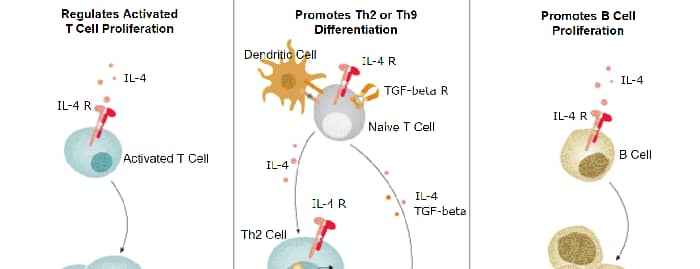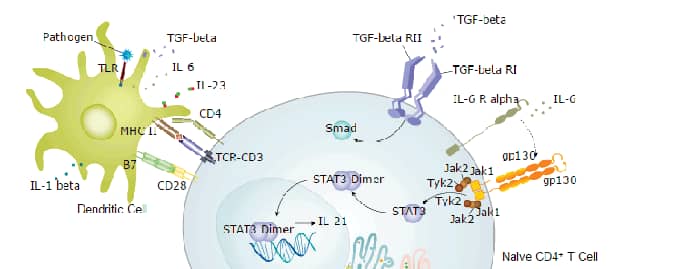TGF-beta 1/1.2 Antibody Summary
Ala279-Ser390
Accession # P01137
Applications
Please Note: Optimal dilutions should be determined by each laboratory for each application. General Protocols are available in the Technical Information section on our website.
Scientific Data
 View Larger
View Larger
TGF‑ beta 1 Inhibition of IL‑4-dependent Cell Proliferation and Neutralization by TGF‑ beta 1/1.2 Antibody. Recombinant Human TGF-beta 1 (Catalog # 240-B) inhibits Recombinant Mouse IL-4 (Catalog # 404-ML) induced proliferation in the HT-2 mouse T cell line in a dose-dependent manner (orange line). Inhibition of Recombinant Mouse IL-4 (7.5 ng/mL) activity elicited by Recombinant Human TGF-beta 1 (1 ng/mL) is neutralized (green line) by increasing concentrations of Chicken Anti-TGF-beta 1/1.2 Antigen Affinity-purified Polyclonal Antibody (Catalog # AF-101-NA). The ND50 is typically ≤100 ng/mL.
Reconstitution Calculator
Preparation and Storage
- 12 months from date of receipt, -20 to -70 °C as supplied.
- 1 month, 2 to 8 °C under sterile conditions after reconstitution.
- 6 months, -20 to -70 °C under sterile conditions after reconstitution.
Background: TGF-beta 1/1.2
TGF-beta 1 (transforming growth factor beta 1) is one of three closely related mammalian members of the large TGF-beta superfamily that share a characteristic cystine knot structure. TGF-beta 1, -2 and -3 are highly pleiotropic cytokines that are proposed to act as cellular switches that regulate processes such as immune function, proliferation and epithelial-mesenchymal transition. Each TGF-beta isoform has some non-redundant functions; for TGF-beta 1, mice with targeted deletion show defects in hematopoiesis and endothelial differentiation, and die of overwhelming inflammation. Human TGF-beta 1 cDNA encodes a 390 amino acid (aa) precursor that contains a 29 aa signal peptide and a 361 aa proprotein. A furin-like convertase processes the proprotein to generate an N-terminal 249 aa latency-associated peptide (LAP) and a C-terminal 112 aa mature TGF- beta 1. Disulfide-linked homodimers of LAP and TGF-beta 1 remain non-covalently associated after secretion, forming the small latent TGF-beta 1 complex. Covalent linkage of LAP to one of three latent TGF-beta binding proteins (LTBPs) creates a large latent complex that may interact with the extracellular matrix. TGF-beta is activated from latency by pathways that include actions of the protease plasmin, matrix metalloproteases, thrombospondin 1 and a subset of integrins. Mature human TGF-beta 1 shares 100% aa identity with pig, dog and cow TGF-beta 1, and 99% aa identity with mouse, rat and horse TGF-beta 1. It demonstrates cross-species activity. TGF-beta 1 signaling begins with high-affinity binding to a type II ser/thr kinase receptor termed TGF-beta RII. This receptor then phosphorylates and activates a second ser/thr kinase receptor, TGF-beta RI (also called activin receptor-like kinase (ALK) -5), or alternatively, ALK‑1. This complex phosphorylates and activates Smad proteins that regulate transcription. Contributions of the accessory receptors betaglycan (also known as TGF-beta RIII) and endoglin, or use of Smad-independent signaling pathways, allow for disparate actions observed in response to TGF-beta in different contexts.
Product Datasheets
Citations for TGF-beta 1/1.2 Antibody
R&D Systems personnel manually curate a database that contains references using R&D Systems products. The data collected includes not only links to publications in PubMed, but also provides information about sample types, species, and experimental conditions.
30
Citations: Showing 1 - 10
Filter your results:
Filter by:
-
Oligodendrocyte precursor cell specification is regulated by bidirectional neural progenitor-endothelial cell crosstalk
Authors: I Paredes, JR Vieira, B Shah, CF Ramunno, J Dyckow, H Adler, M Richter, G Schermann, E Giannakour, L Schirmer, HG Augustin, C Ruiz de Al
Nature Neuroscience, 2021-01-28;0(0):.
Species: Mouse
Sample Types: Whole Cells
Applications: Bioassay -
Deciphering the Molecular Mechanism of Spontaneous Senescence in Primary Epithelial Ovarian Cancer Cells
Authors: M Paku?a, E Ma?y, P Uruski, A Witucka, M Bogucka, N Jaroszewsk, N Makowska, A Niklas, R Moszy?ski, S Sajdak, A Tykarski, J Miku?a-Pie, K Ksi??ek
Cancers (Basel), 2020-01-27;12(2):.
Species: Human
Sample Types: Whole Cells
Applications: Neutralization -
Neutralization of transforming growth factor (TGF)-&beta1 activity reduced fibrosis and enhanced regeneration of glycerol-injured rat muscle
Authors: MAA Mahdy, K Warita, YZ Hosaka
J. Vet. Med. Sci., 2019-12-25;82(2):168-171.
Species: Rat
Sample Types: In Vivo
Applications: In Vivo -
Oral Tolerance Induction to Newly Introduced Allergen is Favored by a Transforming Growth Factor-beta-Enriched Formula
Authors: S Holvoet, M Perrot, N de Groot, G Prioult, T Mikogami, V Verhasselt, S Nutten
Nutrients, 2019-09-13;11(9):.
Species: Mink
Sample Types: Whole Cells
Applications: Neutralization -
A Unique Pattern of Mesothelial-Mesenchymal Transition Induced in the Normal Peritoneal Mesothelium by High-Grade Serous Ovarian Cancer
Authors: M Paku?a, P Uruski, A Niklas, A Wo?niak, D Szpurek, A Tykarski, J Miku?a-Pie, K Ksi??ek
Cancers (Basel), 2019-05-13;11(5):.
Species: Human
Sample Types: Whole Cells
Applications: Neutralization -
The Epithelial-Mesenchymal Transition Initiated by Malignant Ascites Underlies the Transmesothelial Invasion of Ovarian Cancer Cells
Authors: M Paku?a, J Miku?a-Pie, A Witucka, K Kostka-Jez, P Uruski, R Moszy?ski, E Naumowicz, S Sajdak, A Tykarski, K Ksi??ek
Int J Mol Sci, 2019-01-02;20(1):.
Species: Human
Sample Types: Whole Cells
Applications: Neutralization -
The Use of Platelet-Rich and Platelet-Poor Plasma to Enhance Differentiation of Skeletal Myoblasts: Implications for the Use of Autologous Blood Products for Muscle Regeneration
Authors: O Miroshnych, WT Chang, JL Dragoo
Am J Sports Med, 2016-12-27;45(4):945-953.
Species: Human
Sample Types: Platelet Rich Plasma (PRP)
Applications: Immunoprecipitation -
Identification of genetic loci that control mammary tumor susceptibility through the host microenvironment.
Authors: Zhang P, Lo A, Huang Y, Huang G, Liang G, Mott J, Karpen G, Blakely E, Bissell M, Barcellos-Hoff M, Snijders A, Mao J
Sci Rep, 2015-03-09;5(0):8919.
Species: Mouse
Sample Types: Whole Tissue
Applications: IHC -
Oncogenic mutations in intestinal adenomas regulate Bim-mediated apoptosis induced by TGF-beta.
Authors: Wiener Z, Band A, Kallio P, Hogstrom J, Hyvonen V, Kaijalainen S, Ritvos O, Haglund C, Kruuna O, Robine S, Louvard D, Ben-Neriah Y, Alitalo K
Proc Natl Acad Sci U S A, 2014-05-13;111(21):E2229-36.
Species: Human
Sample Types: Cell Culture Supernates
Applications: Immunoprecipitation -
IL-21 induces IL-22 production in CD4+ T cells.
Authors: Yeste A, Mascanfroni I, Nadeau M, Burns E, Tukpah A, Santiago A, Wu C, Patel B, Kumar D, Quintana F
Nat Commun, 2014-05-06;5(0):3753.
Species: Mouse
Sample Types: Whole Cells
Applications: Neutralization -
Expression of versican V3 by arterial smooth muscle cells alters tumor growth factor beta (TGFbeta)-, epidermal growth factor (EGF)-, and nuclear factor kappaB (NFkappaB)-dependent signaling pathways, creating a microenvironment that resists monocyte adhesion.
Authors: Kang I, Yoon D, Braun K, Wight T
J Biol Chem, 2014-04-09;289(22):15393-404.
Species: Rat
Sample Types: Whole Cells
Applications: Neutralization -
Long-term gene therapy with thrombospondin 2 inhibits TGF-beta activation, inflammation and angiogenesis in chronic allograft nephropathy.
Authors: Daniel C, Vogelbacher R, Stief A, Grigo C, Hugo C
PLoS ONE, 2013-12-23;8(12):e83846.
Species: Rat
Sample Types: Whole Tissue
Applications: IHC -
The HIV-1 envelope protein gp120 impairs B cell proliferation by inducing TGF-beta1 production and FcRL4 expression.
Authors: Jelicic K, Cimbro R, Nawaz F, Huang D, Zheng X, Yang J, Lempicki R, Pascuccio M, Van Ryk D, Schwing C, Hiatt J, Okwara N, Wei D, Roby G, David A, Hwang I, Kehrl J, Arthos J, Cicala C, Fauci A
Nat Immunol, 2013-10-27;14(12):1256-65.
Species: Human
Sample Types: Whole Cells
Applications: Blocking -
Identification of the thiol isomerase-binding peptide, mastoparan, as a novel inhibitor of shear-induced transforming growth factor beta1 (TGF-beta1) activation.
Authors: Brophy T, Coller B, Ahamed J
J Biol Chem, 2013-03-05;288(15):10628-39.
Species: Human
Sample Types: Cell Lysates
Applications: Western Blot -
Overexpression of TGF-ß 1 gene induces cell surface localized glucose-regulated protein 78-associated latency-associated peptide/TGF-ß.
Authors: Oida T, Weiner HL
J. Immunol., 2010-08-18;185(6):3529-35.
Species: Human
Sample Types: Cell Lysates
Applications: Western Blot -
Homeostatic role of transforming growth factor-beta in the oral cavity and esophagus of mice and its expression by mast cells in these tissues.
Authors: Vitsky A, Waire J, Pawliuk R, Bond A, Matthews D, Lacasse E, Hawes ML, Nelson C, Richards S, Piepenhagen PA, Garman RD, Andrews L, Thurberg BL, Lonning S, Ledbetter S, Ruzek MC
Am. J. Pathol., 2009-04-30;174(6):2137-49.
Species: Mouse
Sample Types: Saliva
Applications: Western Blot -
TGF-beta promotes thyroid epithelial cell hyperplasia and fibrosis in IFN-gamma-deficient NOD.H-2h4 mice.
Authors: Yu S, Sharp GC, Braley-Mullen H
J. Immunol., 2008-08-01;181(3):2238-45.
Species: Mouse
Sample Types: Whole Tissue
Applications: IHC-P -
The LTK63 adjuvant improves protection conferred by Ag85B DNA-protein prime-boosting vaccination against Mycobacterium tuberculosis infection by dampening IFN-gamma response.
Authors: Palma C, Iona E, Giannoni F, Pardini M, Brunori L, Fattorini L, Del Giudice G, Cassone A
Vaccine, 2008-06-12;26(33):4237-43.
Species: Mouse
Sample Types: Whole Cells
Applications: Neutralization -
Induction of an epithelial integrin alphavbeta6 in human cytomegalovirus-infected endothelial cells leads to activation of transforming growth factor-beta1 and increased collagen production.
Authors: Tabata T, Kawakatsu H, Maidji E, Sakai T, Sakai K, Fang-Hoover J, Aiba M, Sheppard D, Pereira L
Am. J. Pathol., 2008-03-18;172(4):1127-40.
Species: Human
Sample Types: Whole Cells
Applications: Flow Cytometry -
Characterization of in vitro antimurine thymocyte globulin-induced regulatory T cells that inhibit graft-versus-host disease in vivo.
Authors: Ruzek MC, Waire JS, Hopkins D, Lacorcia G, Sullivan J, Roberts BL, Richards SM, Nahill SR, Williams JM, Scaria A, Dzuris J, Shankara S, Garman RD
Blood, 2007-11-19;111(3):1726-34.
Species: Mouse
Sample Types: Whole Cells
Applications: Flow Cytometry -
The cysteine-rich domain protein KCP is a suppressor of transforming growth factor beta/activin signaling in renal epithelia.
Authors: Lin J, Patel SR, Wang M, Dressler GR
Mol. Cell. Biol., 2006-06-01;26(12):4577-85.
Species: Mouse
Sample Types: Cell Lysates
Applications: Western Blot -
Tumor metastasis in an orthotopic murine model of head and neck cancer: possible role of TGF-beta 1 secreted by the tumor cells.
Authors: Dasgupta S, Bhattacharya-Chatterjee M, O'Malley BW, Chatterjee SK
J. Cell. Biochem., 2006-04-01;97(5):1036-51.
Species: Mouse
Sample Types: Whole Tissue
Applications: IHC-Fr, IHC-P -
Activation of transforming growth factor-beta by the integrin alphavbeta8 delays epithelial wound closure.
Authors: Neurohr C, Nishimura SL, Sheppard D
Am. J. Respir. Cell Mol. Biol., 2006-03-30;35(2):252-9.
Species: Human
Sample Types: Whole Cells
Applications: Neutralization -
Expression of growth factors and growth factor receptor in non-healing and healing ischaemic ulceration.
Authors: Murphy MO, Ghosh J, Fulford P, Khwaja N, Halka AT, Carter A, Turner NJ, Walker MG
Eur J Vasc Endovasc Surg, 2006-01-20;31(5):516-22.
Species: Human
Sample Types: Whole Tissue
Applications: IHC -
Persistent cytomegalovirus infection is associated with increased expression of TGF-beta1, PDGF-AA and ICAM-1 and arterial intimal thickening in kidney allografts.
Authors: Helantera I, Loginov R, Koskinen P, Tornroth T, Gronhagen-Riska C, Lautenschlager I
Nephrol. Dial. Transplant., 2005-02-16;20(4):790-6.
Species: Human
Sample Types: Whole Tissue
Applications: IHC -
Neuronal TGF-beta1 mediates IL-9/mast cell interaction and exacerbates excitotoxicity in newborn mice.
Authors: Mesples B, Fontaine RH, Lelievre V, Launay JM, Gressens P
Neurobiol. Dis., 2005-02-01;18(1):193-205.
Species: Mouse
Sample Types: In Vivo
Applications: Neutralization -
Cord blood CD4(+)CD25(+)-derived T regulatory cell lines express FoxP3 protein and manifest potent suppressor function.
Authors: Godfrey WR, Spoden DJ, Ge YG, Baker SR, Liu B, Levine BL, June CH, Blazar BR, Porter SB
Blood, 2004-09-16;105(2):750-8.
Species: Human
Sample Types: Cell Culture Supernates
Applications: Neutralization -
Autoreactive T cells persist in rats protected against experimental autoimmune encephalomyelitis and can be activated through stimulation of innate immunity.
Authors: Conant SB, Swanborg RH
J. Immunol., 2004-05-01;172(9):5322-8.
Species: Rat
Sample Types: Whole Cells
Applications: Neutralization -
Effect of neutralizing transforming growth factor beta1 on the immune response against Mycobacterium tuberculosis in guinea pigs.
Authors: Allen SS, Cassone L, Lasco TM
Infect. Immun., 2004-03-01;72(3):1358-63.
Species: Guinea Pig
Sample Types: In Vivo
Applications: Neutralization -
Inhibition of neointimal hyperplasia after balloon injury by cis-element 'decoy' of early growth response gene-1 in hypercholesterolemic rabbits.
Authors: Ohtani K, Egashira K, Usui M, Ishibashi M, Hiasa KI, Zhao Q, Aoki M, Kaneda Y, Morishita R, Takeshita A
Gene Ther., 2004-01-01;11(2):126-32.
Species: Rabbit
Sample Types: Whole Tissue
Applications: IHC-Fr
FAQs
-
Does AF-101-NA detect other isoforms of TGF-beta?
Cross-reactivity testing results are listed in the Specificity section on the Product Datasheet: less than 15% cross-reactivity with recombinant amphibian TGF-beta 5 and less than 2% with TGF-beta 2 and TGF-beta 3, have been observed, as measured by direct ELISA.
-
Can pro-IL-1 beta be detected by Catalog #s AF-201-NA and MAB601 ?
The amino acid sequence present in mature IL-1 beta (Ala117-Ser269) is also present in pro IL-1 beta. So in theory, both Catalog #s AF-201-NA and MAB601 should detect the pro form of IL-1 beta. The results would depend on whether the pro form is abundantly present in the sample type being evaluated.
Reviews for TGF-beta 1/1.2 Antibody
Average Rating: 5 (Based on 1 Review)
Have you used TGF-beta 1/1.2 Antibody?
Submit a review and receive an Amazon gift card.
$25/€18/£15/$25CAN/¥75 Yuan/¥2500 Yen for a review with an image
$10/€7/£6/$10 CAD/¥70 Yuan/¥1110 Yen for a review without an image
Filter by:











